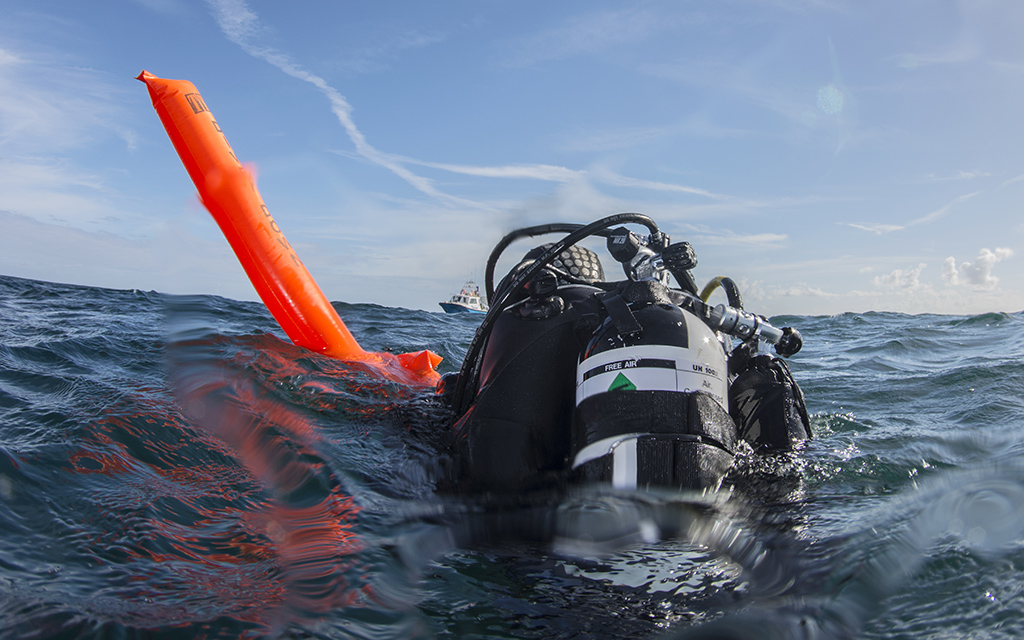
Photo credit: Jane Morgan (representative image only)
While divers missing on the surface can have serious consequences, there are steps we can all take to rectify this occurrence - or even avoid it completely.
While preparing the BSAC Incident report for 2023, which will be published following a presentation at the Diving Conference in Birmingham on 19 October, it appears there is a slight increase in divers missing on the surface before being located. This was reinforced by an observation made by the MCA at a recent meeting. This is not a new occurrence, but it is worth reviewing again how to reduce the consequences of such a situation.
Prevention
Is always better than requiring a cure. One common cause of the RNLI being called out for missing divers is the breakdown of their support vessel. Making sure boats and their equipment are properly maintained and serviced goes a long way to avoiding such a situation. Keeping a proper watch, not just on the dive site but also changing weather conditions and being prepared to recall divers if necessary are all important control measures. As divers you have your own part to play. Make sure you pay attention and understand any dive briefing, so you know how to navigate the site and recongise if conditions are different underwater. Perhaps more importantly, should it be necessary to deviate from the plan, perhaps due to an unexpected current, ensure you have a means of alerting the surface cover to the change, usually by deploying a DSMB.
Preparation
Whilst none of us plan to get lost, should it occur is not the time to consider improving your chances of being found and recovered. The most important factor is to improve your chances of being seen, remember you are a “very small diver in a very big sea”, so planning to carry location aids is something you can do now to make sure they are available should you need them. Now is also a good time to plan what you may wish to add to your Christmas list? Top of the list should be a DSMB, which should be an essential piece of equipment for all divers who go to sea. Other aids will range from the simple through to more expensive but highly reliable electronic signaling devices.
Location
Should you surface and be unable to see your boat, make sure you stay together with your buddy and if you haven’t already deploy your DSMB to increase your visibility. Simple devices such as a signaling mirror or a whistle can be effective at short distances, but you need to be within sight or sound of any search vessels. Avoid using a torch and/or strobe lights unless you can see an approaching vessel, as they are likely to be more effective as the light starts to fail and so you need to preserve the battery life. A torch can also be very effective in low light conditions shone inside a DSMB.
Higher tech options include Personal Location Beacons (PLB), DSC Radios, in suitable protective cases, can alert the emergency services and because they are GMDS approved emergency signaling devices can be used worldwide. Personal Location Devices (PLD) with AIS signaling are not GMDS approved and may not alert the emergency services but would alert any AIS enabled vessels nearby. A great explanation of the use and benefits of these electronic devices is contained within one of the videos for the RNLI Sea Survival Workshop.
More detailed coverage of this subject can be found in the RNLI Sea Survival Workshop. The workshop is a great way to practice and refresh existing skills and introduce new ones providing a broad knowledge of, and practice in, sea-survival techniques. The course can be delivered by any BSAC Open Water Instructor or above using the Instructor resources online, and is designed to be delivered within a branch or BSAC Centre.
Stay safe – dive safe
Jim Watson
Safety and Development Manager


 Author: Jim Watson | Posted 05 Oct 2024
Author: Jim Watson | Posted 05 Oct 2024



